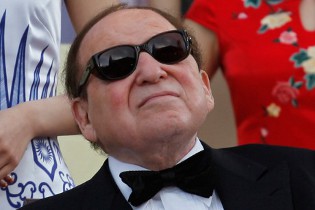
If you hate politics and the money that runs it, stop reading right now. Seriously. Just hit the “back” button and click on another article. I wouldn’t even be offended if you closed this tab altogether and checked to see if the latest “Which [insert television show] character are you?” quiz has popped up on Facebook. What follows will make you want to vomit. Actually WANT to vomit.
The key players with vaults of gold coins in the battle over online poker have been opening their wallets at what look to be record setting levels so far this year. According to OpenSecrets.org, a website that tracks political contributions, have already emptied several clips and the year is only half over.
Let’s start with public enemy number one, everybody’s favorite fogey, Sheldon Adelson. The CEO of the Las Vegas Sands Corp. and founder of the Coalition to Stop Internet Gambling has said that he will do “whatever it takes” to stop online poker, not just from spreading in the United States, but from existing at all. One of his tactics was crafting the Restoration of America’s Wire Act, which was introduced in the Senate by Senator Lindsey Graham (R – S.C.) and in the House by Representative Jason Chaffetz (R – Utah). The bill aims to roll back the interpretation of the Wire Act of 1961 to include all online gambling as illegal activities, not just sports betting as it was originally intended. For a long time, the Act had been interpreted to mean that all online gambling was disallowed, but at the end of 2011, the U.S. Department of Justice revised its opinion, saying that only sports betting was banned by the law. Adelson and friends want it all rolled back and are more than happy if the regulated online gambling markets of Nevada, New Jersey, and Delaware are casualties.
During this cycle, OpenSecrets.org says that the Las Vegas Sands PAC has donated $5,000 to Senator Graham, while members of Adelson’s extended family have contributed $15,600. In the second quarter alone, Las Vegas Sands has spent $290,000 on lobbying either against online gambling or for the twin Restoration of America’s Wire Act bills. All told for the year, the company has forked out $460,000, just $10,000 short of its top spending year, 2008. And again, we’re only half way through the year.
On the other side, proponents of online gambling in the United States have spent even more. OpenSecrets.org says that Caesars Entertainment, which operates online poker rooms in both Nevada and New Jersey, spent $980,000 on lobbying in the second quarter and almost $1.8 million in total for year. Caesars spent $1.9 million all of last year. Several of Caesars’ competitors have opened up the check books, as well. MGM Resorts has spent $240,000 this year, Boyd Gaming spent $230,000 in just the second quarter, and Churchill Downs spent $95,000 in the second quarter. Not all of that money was to lobby for online gaming, but a large portion of it was.
Keep in mind, too, that we are only talking about money that has come from the companies. Sheldon Adelson himself, worth umpteen billion dollars, has an ATM strapped to his back and can easily out-donate his own company. Adelson and his family gave $15 million in 2011 to a Super PAC that supported Newt Gingrich’s bid for the Republican presidential nomination and $30 million more later to Mitt Romney. In 2012, OpenSecrets.org reports that Adelson and his wife contributed over $92 million to political candidates.
























It certainly is sickening, but thanks for this article–it’s important to let people know where these bills (in both the legislative and dollar sense) are coming from. To clear up a misconception about the Wire Act, the interpretation that it applied to non-sports gambling actually wasn’t a “long held” opinion; it only stood for 9 years. Just 9 years out of its 53 years in existence (CEI has a forthcoming paper on this). It was Bush’s DOJ in 2002, specifically the Criminal Division, that first asserted the Act applied to all forms of Internet gambling (see DOJ’s 2002 letter to Nevada Gaming Control Board). As you know, that interpretation was struck down in 2011 by the higher DOJ body known as the Office of Legal Counsel and by then even the Criminal Division expressed doubts about the 2002 interpretation.